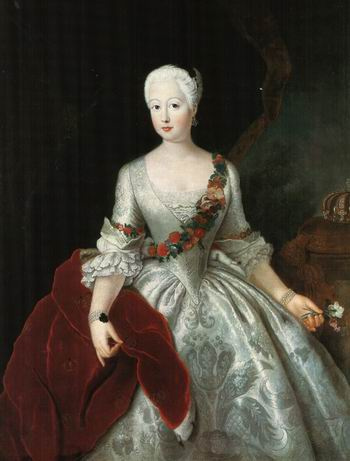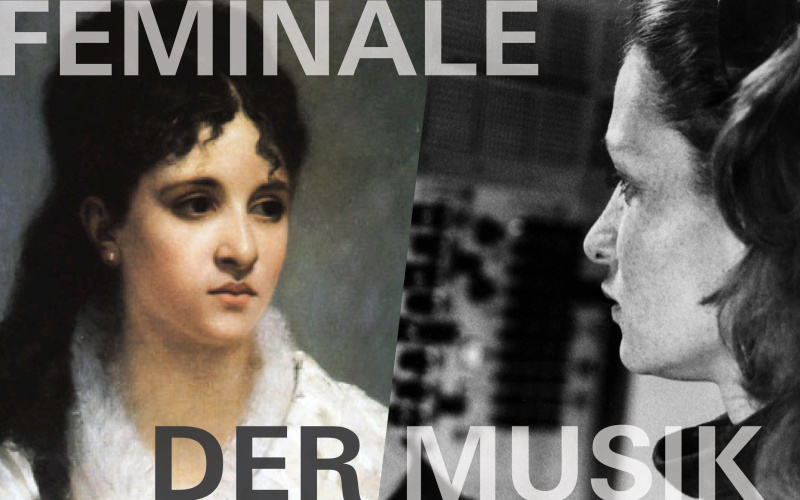Anna Amalia, Princess of Prussia
Feminale of Music
Female composer and abbess – the multifaceted life of Princess Anna Amalia of Prussia characterizes the passionate musician and notation collector.
Anna Amalia is born on November 9, 1723 in Berlin, Germany. She is the youngest daughter of the Prussian »Soldier King« Friedrich Wilhelm I and Queen Sophie Dorothea of Hanover. Although she showed interest in music in her youth, she did not receive regular music lessons until the age of 17, after the death of her father. She is mainly supported by her older brother Frederick the Great. Her most important instruments are piano and organ. Soon she also makes her first attempts at composition of her own, perhaps inspired by her older sister Wilhelmine of Bayreuth, whose greatest work, the opera Argenore, is performed in 1740.
Anna Amalia spends her whole life in Berlin. In 1755 she becomes abbess of the monastery in Quedlinburg and thereby gains financial independence. In 1758 she hires the musician and music theorist Johann Philipp Kirnberger as court musician and music teacher, who will hold this position for almost 30 years until the end of his life. Kirnberger is a sworn follower of Johann Sebastian Bach, whose music was already considered obsolete at this time and was no longer performed. A small circle around Anna Amalia and Kirnberger remains independent of the fashions of the time and is often criticized and ridiculed for this. In Anna Amalia's circle, Bach's music and other »old« music is intensively cultivated. Anna Amalia creates a collection of sheet music which is of inestimable value in music history. Her collection plays a central role in the Bach renaissance, which began at the beginning of the 19th century with the Berlin Sing-Akademie and led to the legendary revival of Bach's St. Matthew Passion by Mendelssohn in 1829.
Music pieces
Only a few of her own compositions have survived. Probably a large part of her work, which includes cantatas, chorales, chamber music and military marches, was destroyed by Anna Amalia herself. Her most famous composition today is probably the flute sonata in F major.
Flute sonata in F major, 2nd set Allegretto, published by Infusion Baroque. Live performance on historical instruments by Alexa Raine-Wright (flute), Andrea Stewart (cello) and Rona Nadler (cembalo) at Notman House, Montreal, QC, 2019.
Flute sonata in F major, 3rd set Allegro ma non troppo, published by Infusion Baroque Live performance on historical instruments by Alexa Raine-Wright (flute), Andrea Stewart (cello) and Rona Nadler (cembalo) at Notman House, Montreal, QC, 2019.
March for the Regiment General of Saldern from Marches and Brass Music (From the Royal House Library of the Berlin Palace), published by Lê Hoàng played by wind players of the Rundfunk-Sinfonie-Orchester Berlin.
Disclaimer
-
Links to external websites of other providers
The ZKM’s express objective is the accuracy and current relevance of any information it makes available on this web site. Mistakes and ambiguities cannot, however, be fully excluded. For this reason, the ZKM is unable to fully guarantee the current relevance, accuracy, completeness or quality of the information it makes available. The ZKM is not subject to coercible legal rules and regulations and to any kind of damages of a material or immaterial nature that may possibly be caused by the use or non-use of the information provided, including free downloads. The ZKM reserves the right to change or delete, to temporarily or permanently suspend access to the web sites at any time.
The responsibility for »external content« to which access is made, in the form of e.g., links, presupposes, among other things, positive knowledge of illegal or punishable content. The ZKM has no influence on this external content and entirely distances itself from such content. Should the displayed external web site include unlawful or offensive content, the ZKM expressly distances itself from such content. When made knowledgeable of such content, the ZKM will deactivate the corresponding link. The same holds for external entries contained in Blogs and discussion forums, links directories, mailing lists and all other forums of databanks operated by the ZKM, the content of which is rendered possible via write access.
All content of the present web site (texts, images, video stills, videos, audios, graphics etc.), the structure as well as the layout of this web site is protected by copyright. These contents, and the information made available by the ZKM (e.g., text and image materials) are available exclusively for individual usage by users of this web site, and not for commercial purposes. These contents may be distributed and copied, made public on the Internet and used for commercial purposes only with the prior consent of the ZKM. Similarly, the placing of deep links, inline links, frame links or similar links in which the ZKM web site is not clearly evident as source, is permitted only with the prior consent of the ZKM. Messages and references to content »share« in social media (e.g. Facebook) do not come under the proviso of this reserve approval. For press releases and photographs valid instructions for usage can be found at: www.zkm.de/en/press/service.
All labels and trademarks named and protected by third parties are subject to the unreserved stipulations of the respective registered owners. That trademarks are not protected by third part rights cannot be assumed merely by mention of the name.
This disclaimer is to be understood as part of the ZKM’s Internet content. In so far as part or single formulations of this text do not, are no longer or are do not entirely correspond to this legal provision, the remaining parts of this document remain unaffected in its content and validity.

